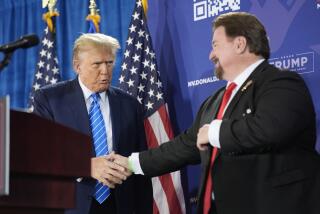Gambling Crackdown Suffers Blow : Courts: A federal judge dismisses 23 of 24 counts in a U.S. indictment involving the use of electronic slot machines in the state’s tribal casinos.
- Share via
A Los Angeles judge has dealt a setback to an attempted crackdown by federal prosecutors on the electronic slot machines used in California’s Indian gambling halls.
U.S. District Judge Richard A. Gadbois Jr. dismissed 23 of the 24 counts in an indictment against the outside managers of the casino on the Morongo Reservation west of Palm Springs, rejecting the use of the powerful federal Organized Crime Control Act to combat the electronic gambling increasingly featured in the state’s tribal casinos.
Gadbois let stand the one count charging the Morongo gambling managers with possessing illegal slot machines in violation of another federal law, the Johnson Act, but such violations carry only a maximum two-year prison sentence.
The U.S. attorney’s office in Los Angeles cited the potential 20-year prison terms under the organized crime act last May upon issuing the first indictment in what was described as an extensive and ongoing investigation of illegal gambling at tribal casinos.
Gadbois’ decision, delivered to attorneys in the case this week, ruled out use of the organized crime law because it targets groups that engage in gambling that is illegal under state penal codes. And although the California Penal Code “bans slot machines without exception,” the judge said, the public policy of California is to permit many types of gambling--thus undercutting the state’s right to impose criminal sanctions against tribal gambling operations.
“A court must look at the state’s entire policy on gambling, not just its attitude toward the games or machines at issue. . . . California public policy is not squarely against gambling,” the judge noted, after several recent court decisions spotlighting the state’s own operation of a lottery and approval of off-track betting.
But in declaring that federal prosecutors could still go after slot machine operators with the longstanding Johnson Act--a law not based on state codes--the Morongo decision again highlighted the confusing legal status of Indian gambling, a factor that has left many tribes uncertain how to proceed and has all but paralyzed government regulatory efforts.
The lead prosecutor in the Morongo case, which is scheduled for trial Nov. 15, said he had not decided whether to go ahead on the single remaining count or appeal Gadbois’ ruling.
“This remains an open and developing area of the law, and interpretations appear to vary throughout the country,” said Assistant U.S. Atty. Jonathan Shapiro. “Clearly the matter has to be resolved either by Congress or the United States Supreme Court.”
One of the defense attorneys in the case, Jim Henderson, said the ruling should encourage California officials to negotiate agreements with the tribes, allowing the popular video gambling so they at least “have a hand in regulating this.”
The state attorney general’s office has refused to agree to any use of the so-called electronic slots on the grounds that they are illegal in California. The state and the tribes are awaiting a crucial ruling from the U.S. 9th Circuit Court of Appeals on whether the state must allow them.
The Morongo indictment did not target members of the small Riverside County tribe but charged the non-Indian casino managers with offenses ranging from money laundering to interstate travel in aid of racketeering--accusing them of skimming millions of dollars from the tribe after installing 140 video keno, poker and “Pot-O-Gold” machines in the casino along Interstate 10. The indictment said the machines generated more than $10 million in revenue over a one-year period.
Indicted were the management firm, E.C. Investments, also known as Great Western Casinos Inc.; its president, Ira Englander, 66, of Los Angeles, and three others.
Santa Monica lawyer Richard P. Crane Jr., who represents the management company and Englander, said at the time that his clients were “outraged at this highhanded action by the United States.”
“I feel a lot better than I felt last week,” Englander said Tuesday.
The federal indictment was viewed as having significance beyond the individual case because courts have ruled that state and local law enforcement agencies no longer have jurisdiction over tribal casinos.
In a case stemming from raids by San Diego County sheriff’s deputies on three tribal casinos, the U.S. 9th Circuit Court of Appeals just last month reaffirmed that Congress had turned over the job of policing such facilities to the federal government when it passed the Indian Gaming Regulatory Act.
More to Read
Sign up for Essential California
The most important California stories and recommendations in your inbox every morning.
You may occasionally receive promotional content from the Los Angeles Times.










